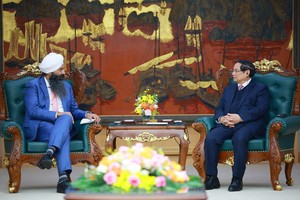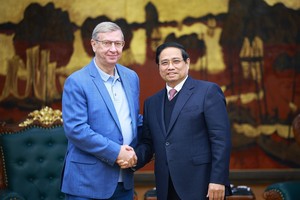The young Angolans taking to the street in a wave of protests against President Jose Eduardo dos Santos are a small group, but government has responded with a crackdown that takes the threat seriously.
The demonstrations against Dos Santos, who marked 32 years in power this month, started in March with about a dozen people and have refused to go away, growing to a peak of about 300 people this month.
Police have responded by jailing participants and unleashing dogs against them, and organisers say they have faced intimidation and death threats. Protests are now banned in Luanda's city centre.
But the demonstrators have refused to back down -- a relatively new phenomenon for Angola, where oil-rich elites wield vast and often unchallenged power.
"The new generation is not as afraid of the government," Jang Nomada, a 29-year-old rapper who has helped organise the protests, told AFP.
"The government is reacting that way because they're not used to seeing young people who are determined to protest. It's a dictatorial system in which anyone who takes to the streets is met with repressive force."
The fall of Libya's Moamer Kadhafi has raised Dos Santos, 69, to the rank of Africa's second-longest ruling leader, after Teodoro Obiang Nguema of Equatorial Guinea.
Political analysts say the revolutions that have swept north Africa have both inspired Angola's young protesters and steeled the Dos Santos government's determination to silence them.
"Clearly the Arab Spring, and the fact that this month President Dos Santos is celebrating 32 years of being president, factors into this defensive position," said Alex Vines, of the research institute Chatham House.
"We've seen this over the last few months, ever since events in Egypt. The government has quite consistently over-reacted," he told AFP.
Angola's protesters have taken some cues from the north African revolutions: they are young, they organise themselves on Facebook, they belong to no particular political party.
But Elias Isaac, local head of the Open Society Initiative for Southern Africa, said the protests have also been shaped -- and limited -- by Angola's unique history, scarred by a 27-year civil war that ended in 2002.
"Because of this history of war, the political system in this country has survived on violence, using the army, the police and the security services," he told AFP.
"There is a lot of fear among the population."
The protests come as debate about Dos Santos' successor has begun to emerge. Citing a source in the ruling MPLA, a private newspaper earlier this month said the president had picked Manuel Vicente, head of state oil company Sonangol, to replace him.
The party's spokesman responded that "any scenario is possible."
As Angola heads into elections next year -- and up to 10 more years of Dos Santos under a constitution ratified last year -- the president faces mounting criticism for his long and often autocratic rule, and his failure to spread the oil wealth in Africa's second-largest petroleum producer.
Dos Santos has presided over average economic growth of 12.5 percent a year since the end of the civil war, and the MPLA won 82 percent of the vote in 2008, the first election that didn't plunge Angola back into violence.
The main opposition, Unita, is meanwhile in disarray, with a host of smaller parties emerging to challenge it and leader Isaias Samakuva battling internal dissent.
In a show of strength, the MPLA has responded to the anti-government protests with a series of carefully choreographed counter-demonstrations calling for peace and unity.
Analysts say it is unlikely the protest movement will seriously threaten the government.
But veteran anti-corruption campaigner Rafael Marques said the most interesting thing about the protests was the government's response.
"What's important about this isn't the number of protesters, it's the way the government reacted," he told AFP.
"The government is afraid of the people."
























